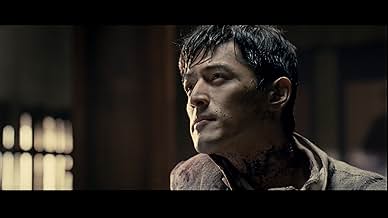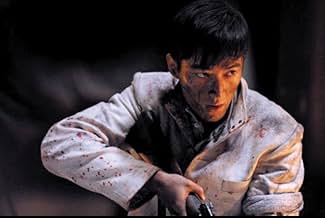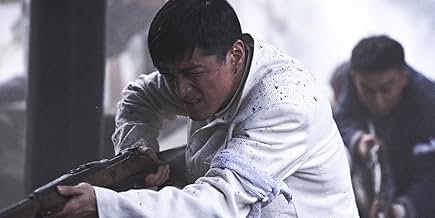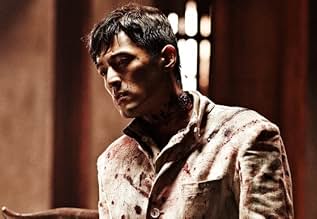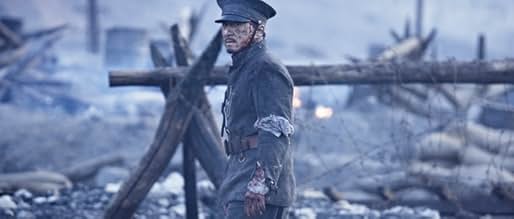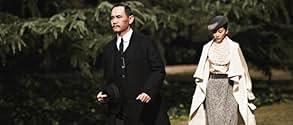CALIFICACIÓN DE IMDb
5.7/10
6.7 k
TU CALIFICACIÓN
Agrega una trama en tu idiomaA historical drama based on the founding of the Republic of China when nationalist forces led by Sun Yat-sen overthrew the Qing Dynasty.A historical drama based on the founding of the Republic of China when nationalist forces led by Sun Yat-sen overthrew the Qing Dynasty.A historical drama based on the founding of the Republic of China when nationalist forces led by Sun Yat-sen overthrew the Qing Dynasty.
- Premios
- 6 premios ganados y 7 nominaciones en total
Bingbing Li
- Xu Zonghan
- (as Bingbing Lee)
Jaycee Cho-Ming Chan
- Zhang Zhenwu
- (as Jaycee Chan)
Yu-Hang To
- Xiong Bingkun
- (as Dennis To)
Duobujie
- Feng Guozhang
- (as Duobuji)
Opiniones destacadas
Made to coincide with the centenary of the original event, 1911 REVOLUTION is a film that celebrates China's rise from the tyranny of the Qing dynasty into the modern era. It's an unashamedly patriotic movie, with clear-cut heroes and villains, and one that seeks to portray a politically complex situation in a massive country, on an international scale, in the space of two hours. The resultant film is an educational ride and historically interesting, but one that falls down when it comes to the basic facets of movie-making.
The film tries to be both a gutsy war film dominated by explosive battle sequences and a compelling political epic, featuring scenes from both sides involved in the revolution. Unfortunately, the editing is quite choppy and the battle scenes, although technically proficient, end up disappointing as you're left wanting more. Characterisation is virtually nil; Jackie bags the best role as the rebellious leader and has a few great action scenes, but everybody else feels like a player in a historical drama, never really coming to full life as they should. There are lots of familiar Chinese actors in various parts, but none of them make much of an impact here.
It's a shame, because there's a film with a similar focus, set five years previously, called BODYGUARDS & ASSASSINS, and I found it absolutely spellbinding. That movie manages to mix in the political intrigue and dramatic backdrop of the situation while at the same time telling a rollicking, action-packed storyline filled with melodrama and excitement. Yes, it was silly and over the top in places, but I'd rather that than this slightly stuffy and occasionally lifeless production that fails to engage the senses along with the intellect.
The film tries to be both a gutsy war film dominated by explosive battle sequences and a compelling political epic, featuring scenes from both sides involved in the revolution. Unfortunately, the editing is quite choppy and the battle scenes, although technically proficient, end up disappointing as you're left wanting more. Characterisation is virtually nil; Jackie bags the best role as the rebellious leader and has a few great action scenes, but everybody else feels like a player in a historical drama, never really coming to full life as they should. There are lots of familiar Chinese actors in various parts, but none of them make much of an impact here.
It's a shame, because there's a film with a similar focus, set five years previously, called BODYGUARDS & ASSASSINS, and I found it absolutely spellbinding. That movie manages to mix in the political intrigue and dramatic backdrop of the situation while at the same time telling a rollicking, action-packed storyline filled with melodrama and excitement. Yes, it was silly and over the top in places, but I'd rather that than this slightly stuffy and occasionally lifeless production that fails to engage the senses along with the intellect.
1911, also known as 1911 Revolution, is a China production which marks two special occasions: 1. To commemorate the 100th anniversary of Xinhai Revolution, which Dr Sun Yat Sen over throws the corrupted Qing Monarchy, marking the two thousand years of monarchy control of China to an end. 2. This is actor and director Jackie Chan's 100th movie. What audience can see from 1911 is not only about how China has come to its way today from the past, but also witness how Jackie Chan is taking a new approach in the types of movie he is making.
Generally 1911 revolves around the few main characters: Chan as Huang Xing, the commander who lead his army to overthrow the Qing Monarchy, Winston Chao as Dr Sun, Li Bing Bing as Xu Zonghan, a revolutionist, who is also a good friend of Sun and Huang's lover, lastly with Joan Chen as Aisin Gioro Lungyu, the Empress who son is Puyi, the last emperor of China. The storyline of 1911 takes place around the last year of Qing Monarchy before the outbreak of Xinhai Revolution, where the story can be split into 2 parts: Huang leading the army to fight against the Qing army, and Sun gathering the support of the Chinese overseas through donations to fund the revolution, and stopping European banks from providing loans to Qing Monarchy. In the later part of the film, however, it falls on how Sun Yat Sen appoints Yuan Shikai, the Prime Minister of Qing Monarchy, as the first President of China Republic.
For those who are expecting Jackie Chan to create something new with his stunts and comical acts, they will be disappointed. 1911 marks Chan taking a serious role in his movie career by telling the remarkable chapter of the China history, which can be seen as another breakthrough after his role as a Chinese illegal immigrant paving a better life at Japan in Shinjuku Incident. (2009) As the director, he did not create any stunts or scenes of war for the sake of pleasing the audience who are seeing more action from him. War scenes are created to tell the pain people go through in a revolution, just as what was mentioned in the film, 'Revolution is not about death, but rather, paving a better future for the future generation.' The movie packs in plenty of details about the stages of the revolution, which provides a good reference for audience who do not have much knowledge about the revolution, and the aftermath of the founding of the Republic. However, those who are seeking action in the film will find 1911 a bore than something that entertains them.
While it seems that Chan is the leading character of 1911, the fact is Chao's role of Sun Yat Sen takes a heavier role compared to other leading role. This is the third time Chao reprise the role of Sun, which he did not disappoints audience who have watched his role as Sun in previous films such as The Soong Sisters (1997). While Chen's role of Lungyu could have been elaborated further, nevertheless it is a good try to see Chen taking one of the leading role, since it is not often she appears in a movie. We can see how Chen brings out the agony of Lungyu, after hearing from the officials in the imperial court on how King Louis XVI was executed by the French's during the French Revolution, hoping that both her son Puyi and herself will be spared from execution. It is also delighting to see Jackie's son, Jaycee, making a cameo appearance as a captain, together with Dennis To (Ip Man 2, The Legend is Born – Ip Man) as a soldier fighting in the revolution.
In short, do not expect too much action and comical appearances from Jackie Chan in 1911. More rather, be entertained with a new role Chan wants to create, which is something that is worth looking forward to in his career.
Generally 1911 revolves around the few main characters: Chan as Huang Xing, the commander who lead his army to overthrow the Qing Monarchy, Winston Chao as Dr Sun, Li Bing Bing as Xu Zonghan, a revolutionist, who is also a good friend of Sun and Huang's lover, lastly with Joan Chen as Aisin Gioro Lungyu, the Empress who son is Puyi, the last emperor of China. The storyline of 1911 takes place around the last year of Qing Monarchy before the outbreak of Xinhai Revolution, where the story can be split into 2 parts: Huang leading the army to fight against the Qing army, and Sun gathering the support of the Chinese overseas through donations to fund the revolution, and stopping European banks from providing loans to Qing Monarchy. In the later part of the film, however, it falls on how Sun Yat Sen appoints Yuan Shikai, the Prime Minister of Qing Monarchy, as the first President of China Republic.
For those who are expecting Jackie Chan to create something new with his stunts and comical acts, they will be disappointed. 1911 marks Chan taking a serious role in his movie career by telling the remarkable chapter of the China history, which can be seen as another breakthrough after his role as a Chinese illegal immigrant paving a better life at Japan in Shinjuku Incident. (2009) As the director, he did not create any stunts or scenes of war for the sake of pleasing the audience who are seeing more action from him. War scenes are created to tell the pain people go through in a revolution, just as what was mentioned in the film, 'Revolution is not about death, but rather, paving a better future for the future generation.' The movie packs in plenty of details about the stages of the revolution, which provides a good reference for audience who do not have much knowledge about the revolution, and the aftermath of the founding of the Republic. However, those who are seeking action in the film will find 1911 a bore than something that entertains them.
While it seems that Chan is the leading character of 1911, the fact is Chao's role of Sun Yat Sen takes a heavier role compared to other leading role. This is the third time Chao reprise the role of Sun, which he did not disappoints audience who have watched his role as Sun in previous films such as The Soong Sisters (1997). While Chen's role of Lungyu could have been elaborated further, nevertheless it is a good try to see Chen taking one of the leading role, since it is not often she appears in a movie. We can see how Chen brings out the agony of Lungyu, after hearing from the officials in the imperial court on how King Louis XVI was executed by the French's during the French Revolution, hoping that both her son Puyi and herself will be spared from execution. It is also delighting to see Jackie's son, Jaycee, making a cameo appearance as a captain, together with Dennis To (Ip Man 2, The Legend is Born – Ip Man) as a soldier fighting in the revolution.
In short, do not expect too much action and comical appearances from Jackie Chan in 1911. More rather, be entertained with a new role Chan wants to create, which is something that is worth looking forward to in his career.
I saw this film on Oct. 9th. 2011. It moves quite quickly at the beginning and there is a lot of war action portrayed in the failed attempts to overthrow the Qing Empire. Chartracters are all identified and that is the only part of the film that detracts from the viewing. The film is in Chinese and by the time you have read the subtitles the characters names are gone. The film is enjoyable if you know Chinese history of this period and if you don't it can be just a series of talking and action scenes and can be quite confusing. Sun yat-sen is the main character but Jackie Chan does get to be more than just an action figure. If you want to more about this period of Chinese this would be the movie to spur you on or illustrate better what was going on in China at this time. Yuan Shi-kai is one character who has appeared in a lot of historical films portraying this period and his actions are as always ones of greed and betrayal.
This film in a word is a mess.
The problem with a lot of historical dramas in general is that their historical scopes are too big to fit neatly into the format of a film. 1911 suffers the same weakness as many other recent "propaganda" movies from mainland China: Irrespective of their propagandistic flairs or contents, they are all trying to cover everything and quickly into a usual 2 hrs duration, a task impossible if not improbable to do well. One has to question how much creative freedom Jackie really had with directing it but even without outside pressure, we can intuit that even Jackie won't want to be liberal with a source material so sensitive and "weighty".
I am not going to delve into the history as you can find better information elsewhere but judging this historical film purely as film, it is unsatisfactory at best. If you want to learn about the 1911 Revolution then perhaps this film would give you a rundown of its historical development; it is mostly centred from the perspective of the revolutionary faction led by Dr. Sun Yat Sen, the founding father of modern nationhood and democracy in China.
As required, you would see plenty of explosions and scenes of war, albeit distributed rather evenly throughout the film, providing as bits of "action" before or after the "civil" and political acts by Sun Yat Sen and the other "players" in the political manoeuvres. The film is littered with bits of textual information supposed to fill you in on the historical facts and significances, but if you are not a fast reader, all of it would fly past your head unless you are a professor in the study of the Revolution. So right off the bat you are witnessing an educational material that lacks substance and depth but only provides you with a general picture and even incomplete at that.
With the typical colour filtering for battle scenes, you are treated with the usual grittiness of war. It is very apparent you are supposed to feel the up welling of emotion as men and women sacrificed their lives for the revolution but if anything, the scenes are so short that before you have the chance/time for up welling, it is over. All we know is that battles were fought, people died, and we move on to the (politic) next part. As a historical book, that is fine, as a movie, it does not work. (Granted some scenes might have been touching but within a film world crammed up with similar attempts at dragging out your inner weak spots, we are emotionally fatigued at best to be moved so easily.)
One would also be appalled at the film's treatment of westerners. They are stereotyped/caricatured and acted awkwardly, seemingly only needed for their appearances and that none of the people hired to act knows how to act. (I mean come on, this is the 21th century, aren't we smart enough now to see through all the old stereotypes and know that people aren't paper cutouts?)
Along with that comes some bad acting on the part of the Chinese casts, where most of them are either wooden or overly melodramatic, some even managed both. Even the Doctor at certain parts of the movie came out awkwardly.
Cinematography. This might be much more centred on my own personal opinion but I find some of the cuts and techniques trying too hard, focusing on style rather than lending itself to the story and the scenes. A lot of potentially good scenes are ruined by fast cuts and awkward transitions which in some cases even provide some hilarious results on a film so centred on seriousness, making it somewhat a deadpan.
I applaud Jackie for taking on directing but maybe perhaps this is not exactly the source material to work with. Personally I find historical films problematic in ways of execution, especially one about politics and dare I say revolutions? There is no way not to read a film like this in propagandistic terms. But then again can there be politic without propaganda? Maybe this one could be read as an irony? The solution to this is: Just don't take on so much, stop making epic political movies all together and give us something much more substantial than the emotionless husks we are always being offered in, dare I say, "sanctioned" art? (But in the case of China, this might be harder than one could imagine.) It is much better to focus on the smaller characters tangled within all these big events, see things from their eyes and get to understand the big picture. The detachment from human emotionality and focusing on the large picture history book-esque is only going to alienate people. For this story, as much as the personage of the doctor is "monumental" and of his endeavours, focus on Sun Yat Sen himself more, his personal struggles, what happens behind doors. Granted this would basically take the film into another direction but political epics just do not work.(At least I haven't seen it work. Western directors already understood the difficulty and infeasibility of trying to cover everything at once. Personally I haven't seen any western films done this way or similarly. If you have seen a successful one, please let me know, I want to learn.)
If a metaphor could be used for this film, then it is akin to watch the scenes outside a fast moving train. Some scenes are nicely shot, well acted, and some sidelined characters having much more commanding presence than the main ones (In this case, I am speaking to the limited screen time roles played by Joan Chen as Empress Dowager Longyu and Chun Sun as Marshal Yuan Shi Kai), but the train is just going too fast for you to take a good look. All this makes you rather be out there...
The problem with a lot of historical dramas in general is that their historical scopes are too big to fit neatly into the format of a film. 1911 suffers the same weakness as many other recent "propaganda" movies from mainland China: Irrespective of their propagandistic flairs or contents, they are all trying to cover everything and quickly into a usual 2 hrs duration, a task impossible if not improbable to do well. One has to question how much creative freedom Jackie really had with directing it but even without outside pressure, we can intuit that even Jackie won't want to be liberal with a source material so sensitive and "weighty".
I am not going to delve into the history as you can find better information elsewhere but judging this historical film purely as film, it is unsatisfactory at best. If you want to learn about the 1911 Revolution then perhaps this film would give you a rundown of its historical development; it is mostly centred from the perspective of the revolutionary faction led by Dr. Sun Yat Sen, the founding father of modern nationhood and democracy in China.
As required, you would see plenty of explosions and scenes of war, albeit distributed rather evenly throughout the film, providing as bits of "action" before or after the "civil" and political acts by Sun Yat Sen and the other "players" in the political manoeuvres. The film is littered with bits of textual information supposed to fill you in on the historical facts and significances, but if you are not a fast reader, all of it would fly past your head unless you are a professor in the study of the Revolution. So right off the bat you are witnessing an educational material that lacks substance and depth but only provides you with a general picture and even incomplete at that.
With the typical colour filtering for battle scenes, you are treated with the usual grittiness of war. It is very apparent you are supposed to feel the up welling of emotion as men and women sacrificed their lives for the revolution but if anything, the scenes are so short that before you have the chance/time for up welling, it is over. All we know is that battles were fought, people died, and we move on to the (politic) next part. As a historical book, that is fine, as a movie, it does not work. (Granted some scenes might have been touching but within a film world crammed up with similar attempts at dragging out your inner weak spots, we are emotionally fatigued at best to be moved so easily.)
One would also be appalled at the film's treatment of westerners. They are stereotyped/caricatured and acted awkwardly, seemingly only needed for their appearances and that none of the people hired to act knows how to act. (I mean come on, this is the 21th century, aren't we smart enough now to see through all the old stereotypes and know that people aren't paper cutouts?)
Along with that comes some bad acting on the part of the Chinese casts, where most of them are either wooden or overly melodramatic, some even managed both. Even the Doctor at certain parts of the movie came out awkwardly.
Cinematography. This might be much more centred on my own personal opinion but I find some of the cuts and techniques trying too hard, focusing on style rather than lending itself to the story and the scenes. A lot of potentially good scenes are ruined by fast cuts and awkward transitions which in some cases even provide some hilarious results on a film so centred on seriousness, making it somewhat a deadpan.
I applaud Jackie for taking on directing but maybe perhaps this is not exactly the source material to work with. Personally I find historical films problematic in ways of execution, especially one about politics and dare I say revolutions? There is no way not to read a film like this in propagandistic terms. But then again can there be politic without propaganda? Maybe this one could be read as an irony? The solution to this is: Just don't take on so much, stop making epic political movies all together and give us something much more substantial than the emotionless husks we are always being offered in, dare I say, "sanctioned" art? (But in the case of China, this might be harder than one could imagine.) It is much better to focus on the smaller characters tangled within all these big events, see things from their eyes and get to understand the big picture. The detachment from human emotionality and focusing on the large picture history book-esque is only going to alienate people. For this story, as much as the personage of the doctor is "monumental" and of his endeavours, focus on Sun Yat Sen himself more, his personal struggles, what happens behind doors. Granted this would basically take the film into another direction but political epics just do not work.(At least I haven't seen it work. Western directors already understood the difficulty and infeasibility of trying to cover everything at once. Personally I haven't seen any western films done this way or similarly. If you have seen a successful one, please let me know, I want to learn.)
If a metaphor could be used for this film, then it is akin to watch the scenes outside a fast moving train. Some scenes are nicely shot, well acted, and some sidelined characters having much more commanding presence than the main ones (In this case, I am speaking to the limited screen time roles played by Joan Chen as Empress Dowager Longyu and Chun Sun as Marshal Yuan Shi Kai), but the train is just going too fast for you to take a good look. All this makes you rather be out there...
Don't get me wrong, I enjoyed certain parts of this film with some superb performances from the main cast. But for the most part it was distinctly average verging on boring, mainly let down by the poor editing (although Singaporean censors may be partly to blame for that) and some laughable acting and scripting, A good example of the latter is the cringeworthy English dialogue for the character of Homer Lea, which is played by (what seems to be) an inexperienced Western actor. Maybe it's the script's fault, but he's the Jar Jar Binks of this production. Fortunately his scenes are very limited in number, but the film could have done without them altogether and be better for it.
All in all, I learned a little Chinese history. I just wish it was more entertaining.
All in all, I learned a little Chinese history. I just wish it was more entertaining.
¿Sabías que…?
- TriviaJackie Chan's one hundredth movie.
- ErroresWhen the revolutionary leader is on the ocean liner heading for China, the lifeboats on deck are too modern: they are painted bright orange and have built-in engines (note the propellers). The movie is set in 1911, so none of these characteristics would be present. Lifeboats of that era were rowboats, usually painted white.
- Citas
Sun Yat-Sen: The goal of revolution isn't death, but to change fate. Young people are sacrificing themselves for the revolution, so that the living can lead better lives.
- Versiones alternativasThe original version has a run time of 121 minutes. The more common release is only 99 minutes long
Selecciones populares
Inicia sesión para calificar y agrega a la lista de videos para obtener recomendaciones personalizadas
- How long is 1911?Con tecnología de Alexa
Detalles
Taquilla
- Presupuesto
- USD 18,000,000 (estimado)
- Total en EE. UU. y Canadá
- USD 135,739
- Fin de semana de estreno en EE. UU. y Canadá
- USD 55,850
- 9 oct 2011
- Total a nivel mundial
- USD 3,807,134
- Tiempo de ejecución1 hora 39 minutos
- Color
- Mezcla de sonido
- Relación de aspecto
- 2.35 : 1
Contribuir a esta página
Sugiere una edición o agrega el contenido que falta

Principales brechas de datos
What is the French language plot outline for Xin hai ge ming (2011)?
Responda

